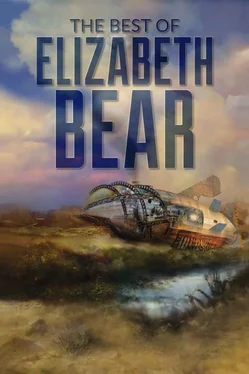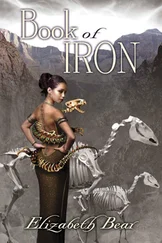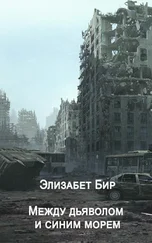She lives, for she is full of balms, and bitter herbs, and strong. She lives, not yet resigned to the burning.
To the having been burned.
She lives, and the burning continues. The burning continues because having once been burned, if she allows herself to stop burning, she is going to have to think about repairs.
Here youare in the ruins.
The ruins are your home as well.
The womanthe dragon burned fears letting the fire die, and the fear makes her angry. She feeds the flames on her anger, so the fire makes fear and the fear makes fire. It hurts, but she cannot stop burning. If she stops burning, she may get burned again.
It goes on like that for a long time.
The firesfilled the space around her. The flames were copper, were cobalt, were viridian, were vermilion. They licked your jaw and up the side of your face quite pleasingly as you sheltered her. Not that she needed the shelter now that she was burning.
You wished, though, that she would sing again.
She tried, occasionally. But all that came out when she made the attempt is colored flames.
The womanthe dragon burned gets tired of burning. She gets tired of touching the dragon and feeling only flames stroke her hands. She gets tired of touching herself, of dropping her face into her palms and feeling only heat and ash. She gets tired of the little puffs of flame that are all she can produce when she tries to sing, burning will o’ the wisps that are about nothing but the fact that they are burning.
She decides to let the fire go out, but it’s not so easy not being angry. Not being afraid. Finding ways to steal fuel from the fire.
But bit by bit, she does so. Bit by bit, the flames flicker and fade.
Underneath she is charred like a curved trunk that has smoldered and cracked. Her skin is burned rugged as a scree slope, broken facets of carbon slick with anthracite rainbows. She trails veils of debris, like lacy webs of paper ash.
The scars are armor. Better armor than the skin before. Not so good as the flames, but they will keep her safe as she heals.
The scars slowly tighten. Contract. They curl her hands and hunch her shoulders. They seal her face into an expression without expression. She is stiff and imprisoned in her own hide.
She cannot sing now either.
And she certainly cannot climb back down again.
She amuses herself as best she can. The dragon gives her small things. Toys or tools, but bits of its body. Parts of itself. A scale for a table, a bit of claw for an inkwell.
The womanwrote a poem for you.
It was a poem that began, “I am the woman who still loves the dragon that burned me.”
She wrote it on the armor over your heart. She cut it there with a pen made from a sliver of the black glass from your spines, and she filled the letters with your silver blood, and there it shone, and shines.
The wintercomes and the winter goes.
There is a curl of green among the ash below, the great trees fallen like new-combed hair.
One daythe woman began to dig at her skin. Her nails had grown long and ragged. Blood and lymph welled.
“What are you doing?” you asked her.
“It itches,” she said.
You gave her another bit of spine to make a knife with and watched as bit by bit she peeled a narrow strip of scar away. The skin underneath was new, more tender than her old skin. It did not look like her old skin, either; it was raw, and unpretty, and she flinched at every touch.
She couldn’t bear to work at peeling herself for more than a few inches of scar at a time. It hurt, and you didn’t really understand hurting, but she made noises and water ran from her eyes.
But she had never lacked for courage. The knight a dragon loves must surely have plenty of that. So you watched as over the summer and the spring and the winter that followed, bit by bit, she peeled her corrugated scars away. They had made her look a bit like you.
You did not miss them.
Everything ispain.
Beneath the pain is freedom.
At firstshe shied away from you, her new flesh rare and weeping.
You flew away. You passed over blasted forests and plains of basalt. You passed over soft meadows, and curving shores. You stood over still water, and looked at the words she had carved into your armor, reflected backwards and still shining.
You tried to understand.
But it was pain, and a dragon has never felt pain.
She still hid when you returned.
But she was a woman who loved a dragon, and such people are brave. Eventually she came and sat beside you on the stone. She rubbed her shoulder absently, fingers moving over scar-laced skin.
“You arebecause you are,” the woman says. Her hair is growing in again, a thick black cloud that has never pressed beneath a helm. “And I love you because you are. But I fear you because you hurt me.”
“And you?” the dragon asks her.
“I fear myself because I made myself open to hurting.”
“But you flew.”
“I flew.”
“And you survived the burning.”
The woman is silent.
“And what you made of yourself this time was not for anyone but you. Now truly you have done what others have no claim to.”
The woman is silent still.
“Are you the litany of your boasting?”
“No,” the woman says. “I am the thing I am. I am the space I take up in the world.”
“And so am I,” the dragon says.
“We should go fly,” the woman says.
Dragons areundying, after all.
You could not keep her.
But she left behind a song. And the space she took up inside you. And the space she left empty in the world.
She stillloves the dragon that set her on fire, but the love has been tempered now.
Читать дальше













